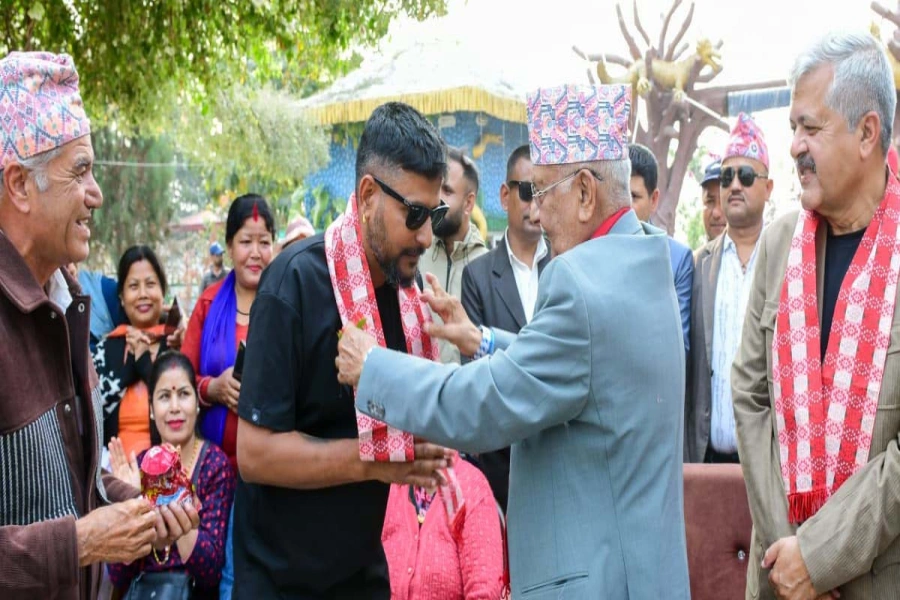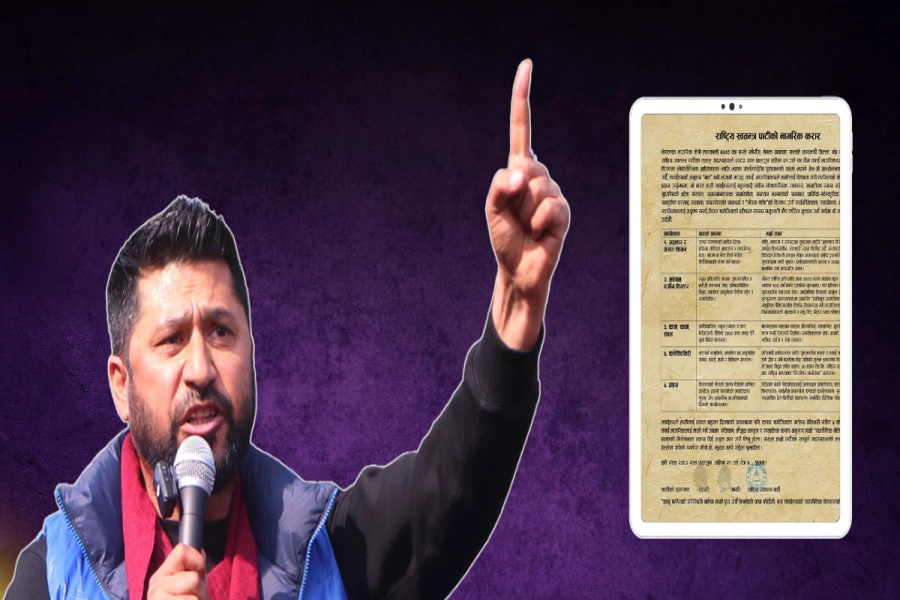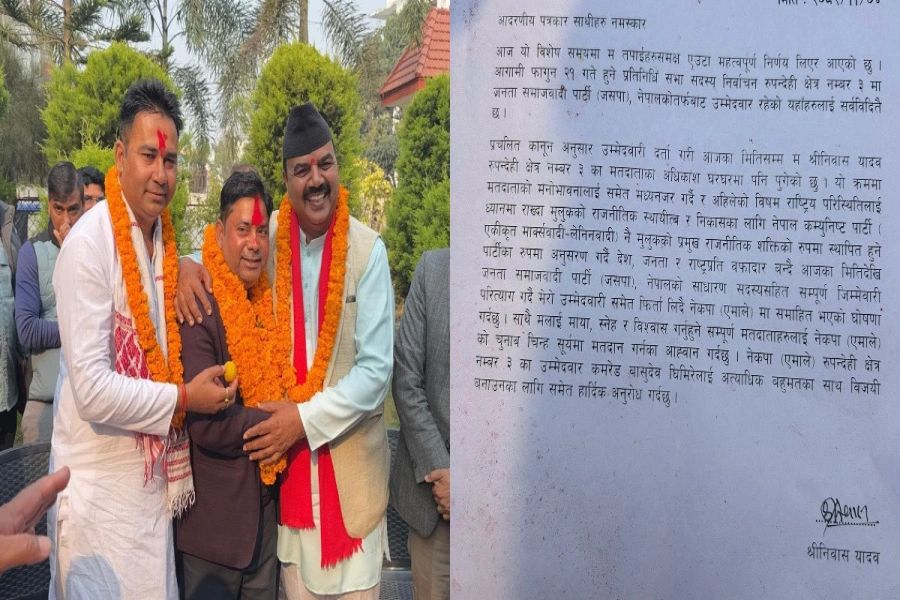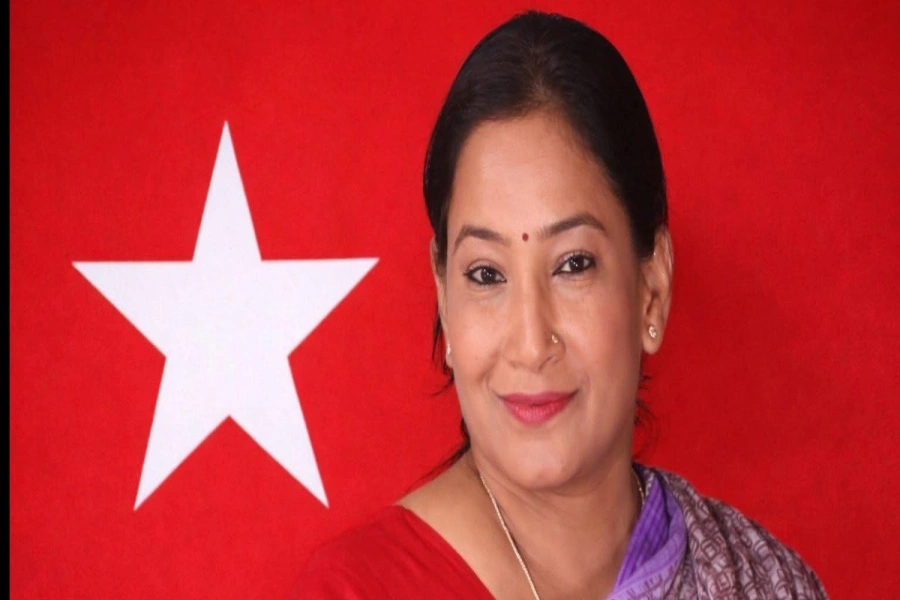KATHMANDU, Feb 16: UML Chairman Khadga Prasad (KP) Sharma Oli who guided the UML-led left alliance to a historic win in the parliamentary and provincial polls was sworn in as Nepal's new prime minister at Office of President on Thursday.
Oli, who was unanimously elected the parliamentary party leader by his party on Wednesday, was administered the oath of office by President Bidya Devi Bhandari shortly after his party, backed by another left party, the CPN Maoist Center, staked claim to the helm of the government citing the support of majority lawmakers in parliament.
Oli was appointed Nepal's 38th prime minister around two hours after Nepali Congress President Sher Bahadur Deuba announced his resignation in a televised address to the nation.
Oli has formed a three-member cabinet comprising Lalbabu Pandit as minister for Environment and Population and Tham Maya Thapa as minister for Women, Children and Social Welfare. Pandit and Thapa were also administered oath of office by President Bhandari. Oli and cabinet members, as customary among communist leaders, took oath in name of the people.
Soon after assuming the office, Prime Minister Oli took to Twitter to thank all those including the left alliance that helped him to be elected as the new prime minister. "I have confidence that I would receive support and cooperation from all Nepali brothers and sisters living at home and abroad for the development and prosperity of the nation," he said in a Twitter message.
What next: Midterm elections or a full-term Oli govt?

UML leaders said that the cabinet would get full shape once a power-sharing deal will be finalized with the Maoist Center.
UML leaders said that the cabinet would get full shape once a power-sharing deal will be finalized with the Maoist Center, the partner in the coalition which has demanded an agreement on party unity before joining the government.
With Thursday's appointment, Oli became the second communist prime minister after the late Manmohan Adhikari to lead a leftist government. He is also the second leftist leader after Maoist Chairman Pushpa Kamal Dahal to be prime minister for two terms.
Oli began his political career in 1966 in opposition to the party-less Panchayat System. He joined the Communist Party of Nepal in February 1970. He became involved in subversive politics and was arrested for the first time in 1970. A year later he became a district committee member of the party and the chief of the Jhapa Movement Organizing Committee in 1972. Oli was imprisoned for 14 consecutive years from 1973 to 1987. After his release from prison in 1987, he became a central committee member of the UML and in-charge of the Lumbini Zone until 1990.
Oli emerged as a major player in Kathmandu political corridor after he became chair of UML on July 17, 2014. His popularity rose during his first stint as prime minister in 2015 when he signed several landmark agreements with China after India imposed an economic blockade on Nepal. He also rejected to bow down to Indian pressure to revise the constitution. The agreement and his openly anti-Indian rhetoric helped Oli emerge into a firebrand nationalist. The UML tactfully cashed in on the Oli fervor to emerge as the largest political force in the three tiers of elections--the local, provincial and parliamentary. The left alliance comprising UML and the Maoists had won a majority in the elections for the federal parliament and six of the seven provinces held on November 26 and December 7.
The nationalist sentiment may have helped Oli to return to power once again but the road ahead will not be easy. Oli who is expected to remain in power for three years as per an understanding reached with Maoist Center will be the longest-serving prime minister since the political change of post-1990. The three years will be both opportunity and challenge for him.
The challenges that Oli faces would be far bigger than those of many other prime ministers, mainly due to unprecedented trust bestowed by voters. If the left's mandate is big, the expectations that the people have from KP Oli are bigger.
Oli's biggest challenge would be to take the country toward the path of economic prosperity. In their joint manifesto released before the elections, UML and the Maoist Center had made political stability and economic reforms their main agenda. But economic reforms are easier said than done, especially in a country like Nepal which has virtually no industrial sector. Oli has inherited a country which has one gainfully employed person in more than fifty-six percent households, according to surveys.
It will also be challenging for the new prime minister to mend ties with India while keeping his image of a nationalist leader intact. It will also be interesting to see how sincerely he will put agreement with China into implementation while taking India into confidence. During his first term, Oli had signed a 10-point deal with China on a range of issues including free trade, transport connectivity and financial cooperation.
It will also be a daunting task to conclude the planned unification between UML and the Maoist Center and at the same time keep his party united.






































